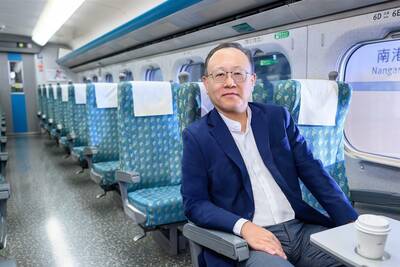Sin Trend Video might have difficulties securing approval for its application to establish a national news channel from the National Communications Commission (NCC), after some commissioners questioned the need to set up an additional news channel in Taiwan’s saturated market.
The broadcast authority began reviewing the application from the Taichung-based media firm, which it received in January last year.
Sin Trend’s news channel, which would be called Taiwan Daily Network (台灣生活新聞), has begun broadcasting on YouTube. Securing a broadcasting license from the NCC would allow it to air on cable or Chunghwa Telecom’s multimedia-on-demand system.
Taiwan Daily Network chairwoman Liao Tzu-chen (廖紫岑) and other channel representatives were invited to the commission yesterday morning to answer questions from NCC commissioners, NCC Vice Chairman and spokesman Wong Po-tsung (翁柏宗) told a news conference.
“Commissioners mainly focused on the channel’s business plan... We have yet to deliberate on the case and have not reached a decision,” Wong said, adding that the review would resume after the channel’s management submits supplementary information.
Based on the channel’s presentation to the NCC, the Taiwan Daily Network would be a national broadcaster, but it would devote a large share of airtime to local news coverage, making it different from other national news channels.
The channel would focus on central and southern Taiwan, and examine local issues from the viewpoints of residents, its management told NCC commissioners.
The channel told commissioners that it has 102 employees, but is planning to expand the personnel to 300, Wang said, adding that each of Taiwan’s six special municipalities would have a news department.
The channel would air local news in the afternoon and national news at 6pm, Wong said.
Like at Mirror News, which received its broadcasting license before the Lunar New Year holiday, National Chengchi University journalism professor Liu Hui-wen (劉慧雯) and National Chung Cheng University communications professor Tsai Tsung-lung (蔡崇隆) would act as ombudsmen at Taiwan Daily Network, Wong said.
National Chung Cheng University communications professor Kuang Chung-shian (管中祥) would act as the convener of its media ethics committee, he added.
However, some commissioners told the network that Taiwan had too many news channels and asked how it is planning to set itself apart from others, Wong said.
In addition to Sin Trend, Liang also owns Taiwan Optical Platform (TOP), the nation’s fourth-largest multiple cable system operator.
“Another critical issue is whether a multiple system operator should be allowed to operate a news channel as well, and if such vertical integration would impede other channels from accessing cable systems,” he said.
As TOP is a publicly traded company, commissioners asked the channel how it could avoid receiving investment from the government and political parties, Wong said.
Liao said that TOP and Sin Trend are separate firms, adding that the channel would adhere to regulations on government, political party and military investment.
A task force charged with conducting a preliminary review of the application recommended that it be rejected.

The inspection equipment and data transmission system for new robotic dogs that Taipei is planning to use for sidewalk patrols were developed by a Taiwanese company, the city’s New Construction Office said today, dismissing concerns that the China-made robots could pose a security risk. The city is bringing in smart robotic dogs to help with sidewalk inspections, Taipei Deputy Mayor Lee Ssu-chuan (李四川) said on Facebook. Equipped with a panoramic surveillance system, the robots would be able to automatically flag problems and easily navigate narrow sidewalks, making inspections faster and more accurate, Lee said. By collecting more accurate data, they would help Taipei

STATS: Taiwan’s average life expectancy of 80.77 years was lower than that of Japan, Singapore and South Korea, but higher than in China, Malaysia and Indonesia Taiwan’s average life expectancy last year increased to 80.77 years, but was still not back to its pre-COVID-19 pandemic peak of 81.32 years in 2020, the Ministry of the Interior said yesterday. The average life expectancy last year increased the 0.54 years from 2023, the ministry said in a statement. For men and women, the average life expectancy last year was 77.42 years and 84.30 years respectively, up 0.48 years and 0.56 years from the previous year. Taiwan’s average life expectancy peaked at 81.32 years in 2020, as the nation was relatively unaffected by the pandemic that year. The metric

TAKING STOCK: The USMC is rebuilding a once-abandoned airfield in Palau to support large-scale ground operations as China’s missile range grows, Naval News reported The US Marine Corps (USMC) is considering new sites for stockpiling equipment in the West Pacific to harden military supply chains and enhance mobility across the Indo-Pacific region, US-based Naval News reported on Saturday. The proposed sites in Palau — one of Taiwan’s diplomatic allies — and Australia would enable a “rapid standup of stored equipment within a year” of the program’s approval, the report said, citing documents published by the USMC last month. In Palau, the service is rebuilding a formerly abandoned World War II-era airfield and establishing ancillary structures to support large-scale ground operations “as China’s missile range and magazine

Passengers on Taiwan High Speed Rail (THSR) will be required to use headphones and make phone calls in gangways under new “quiet travel” rules starting Sept. 22. THSR Chairman Shih Che (史哲) told media that THSR will run a three-month promotional campaign to ensure widespread adoption of the new rules. Those repeatedly ignoring the guidance face the potential termination of their transport contract, which can result in them getting escorted off the train, according to THSR. Shih shared his hope to cultivate an environment conducive to rest and reading for the train’s passengers, stating that these changes aim to “promote self-discipline” among passengers